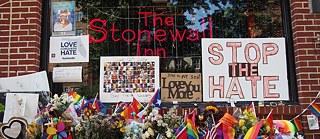New York, 1969: Drag queens, transgender people, gays, and lesbians, among them many people of color and homeless youth. The Stonewall Inn. A raid on the popular bar, but this time around the motley crew resists the police’s brutality.

The fight at the Stonewall Inn lasts for days. The press reports about violent riots on Christopher Street. It’s not the first uprising of the community but it becomes a beacon, the starting point of a movement that spreads from here to the rest of the world. A movement that increasingly resists discrimination against those who do not want to submit to gender norms. Every year on Christopher Street Day, the queer community commemorates this revolt. With courage and self-confidence, in Gay Pride parades across the globe, its members demand freedom to live and to desire in their own way.
FROM THE GAY AND LESBIAN MOVEMENT TO GENDER DIVERSITY
While initially the gay and lesbian movement initially attracted the most attention, the term “queer” is now used to refer to the full spectrum of gender identities and lifestyles. In many countries, the law protects the rights of minorities and enables an increasing number of people to lead self-determined lives. At least legally, queerness has made it to mainstream society. However, massive resistance against non-heteronormative ways of life remains.
JUSTICE FOR ALL
The Goethe-Institut is committed to freedom and equality. Issues such as censorship, racism, violence, religion, education, poverty, war, refugees, exploitation, fake news, #MeToo, and queerness need public debate. Around the world, queer people are still exposed to everyday discrimination, threats, and persecution. In Germany, paragraph 175 of the Penal Code was only abolished in 1994. Dating back to the German Empire, it sent tens of thousands to prisons and concentration camps during the Nazi period. Persecution remained in the Federal Republic of Germany as well, where more than 50,000 people were sent to prison in the 1950s and 60s. Most postwar victims were not rehabilitated until 2017.
Stonewall 5.0: HALF A CENTURY OF QUEER HISTORY
Together with Schwules Museum Berlin and the Federal Agency for Civic Education, the North American branches of the Goethe-Institut take the 50th anniversary of the Stonewall riots as an opportunity to explore the current state of gender diversity in society. We tell the story of the queer movements in West and East Germany with a special focus on transatlantic exchange as a “rainbow friendship” with North America: then, now, and with regards to the future. Exhibitions, discussions, personal memories, films, and teaching materials reflect the cultural, political, and social development of the queer movement.
